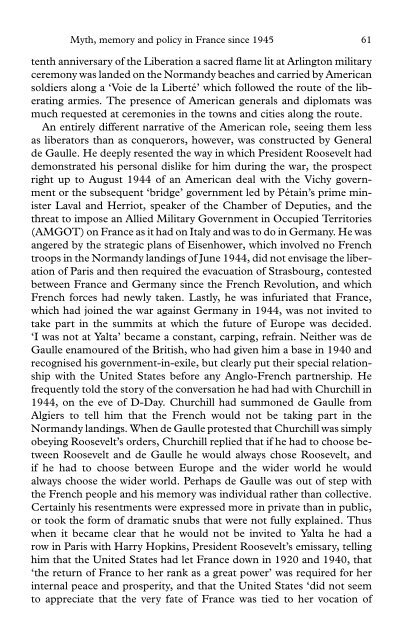Memory and Power in Post-War Europe: Studies in the Presence of ...
Memory and Power in Post-War Europe: Studies in the Presence of ...
Memory and Power in Post-War Europe: Studies in the Presence of ...
Create successful ePaper yourself
Turn your PDF publications into a flip-book with our unique Google optimized e-Paper software.
Myth, memory <strong>and</strong> policy <strong>in</strong> France s<strong>in</strong>ce 1945 61<br />
tenth anniversary <strong>of</strong> <strong>the</strong> Liberation a sacred flame lit at Arl<strong>in</strong>gton military<br />
ceremony was l<strong>and</strong>ed on <strong>the</strong> Norm<strong>and</strong>y beaches <strong>and</strong> carried by American<br />
soldiers along a ‘Voie de la Liberté’ which followed <strong>the</strong> route <strong>of</strong> <strong>the</strong> liberat<strong>in</strong>g<br />
armies. The presence <strong>of</strong> American generals <strong>and</strong> diplomats was<br />
much requested at ceremonies <strong>in</strong> <strong>the</strong> towns <strong>and</strong> cities along <strong>the</strong> route.<br />
An entirely different narrative <strong>of</strong> <strong>the</strong> American role, see<strong>in</strong>g <strong>the</strong>m less<br />
as liberators than as conquerors, however, was constructed by General<br />
de Gaulle. He deeply resented <strong>the</strong> way <strong>in</strong> which President Roosevelt had<br />
demonstrated his personal dislike for him dur<strong>in</strong>g <strong>the</strong> war, <strong>the</strong> prospect<br />
right up to August 1944 <strong>of</strong> an American deal with <strong>the</strong> Vichy government<br />
or <strong>the</strong> subsequent ‘bridge’ government led by Péta<strong>in</strong>’s prime m<strong>in</strong>ister<br />
Laval <strong>and</strong> Herriot, speaker <strong>of</strong> <strong>the</strong> Chamber <strong>of</strong> Deputies, <strong>and</strong> <strong>the</strong><br />
threat to impose an Allied Military Government <strong>in</strong> Occupied Territories<br />
(AMGOT) on France as it had on Italy <strong>and</strong> was to do <strong>in</strong> Germany. He was<br />
angered by <strong>the</strong> strategic plans <strong>of</strong> Eisenhower, which <strong>in</strong>volved no French<br />
troops <strong>in</strong> <strong>the</strong> Norm<strong>and</strong>y l<strong>and</strong><strong>in</strong>gs <strong>of</strong> June 1944, did not envisage <strong>the</strong> liberation<br />
<strong>of</strong> Paris <strong>and</strong> <strong>the</strong>n required <strong>the</strong> evacuation <strong>of</strong> Strasbourg, contested<br />
between France <strong>and</strong> Germany s<strong>in</strong>ce <strong>the</strong> French Revolution, <strong>and</strong> which<br />
French forces had newly taken. Lastly, he was <strong>in</strong>furiated that France,<br />
which had jo<strong>in</strong>ed <strong>the</strong> war aga<strong>in</strong>st Germany <strong>in</strong> 1944, was not <strong>in</strong>vited to<br />
take part <strong>in</strong> <strong>the</strong> summits at which <strong>the</strong> future <strong>of</strong> <strong>Europe</strong> was decided.<br />
‘I was not at Yalta’ became a constant, carp<strong>in</strong>g, refra<strong>in</strong>. Nei<strong>the</strong>r was de<br />
Gaulle enamoured <strong>of</strong> <strong>the</strong> British, who had given him a base <strong>in</strong> 1940 <strong>and</strong><br />
recognised his government-<strong>in</strong>-exile, but clearly put <strong>the</strong>ir special relationship<br />
with <strong>the</strong> United States before any Anglo-French partnership. He<br />
frequently told <strong>the</strong> story <strong>of</strong> <strong>the</strong> conversation he had had with Churchill <strong>in</strong><br />
1944, on <strong>the</strong> eve <strong>of</strong> D-Day. Churchill had summoned de Gaulle from<br />
Algiers to tell him that <strong>the</strong> French would not be tak<strong>in</strong>g part <strong>in</strong> <strong>the</strong><br />
Norm<strong>and</strong>y l<strong>and</strong><strong>in</strong>gs. When de Gaulle protested that Churchill was simply<br />
obey<strong>in</strong>g Roosevelt’s orders, Churchill replied that if he had to choose between<br />
Roosevelt <strong>and</strong> de Gaulle he would always chose Roosevelt, <strong>and</strong><br />
if he had to choose between <strong>Europe</strong> <strong>and</strong> <strong>the</strong> wider world he would<br />
always choose <strong>the</strong> wider world. Perhaps de Gaulle was out <strong>of</strong> step with<br />
<strong>the</strong> French people <strong>and</strong> his memory was <strong>in</strong>dividual ra<strong>the</strong>r than collective.<br />
Certa<strong>in</strong>ly his resentments were expressed more <strong>in</strong> private than <strong>in</strong> public,<br />
or took <strong>the</strong> form <strong>of</strong> dramatic snubs that were not fully expla<strong>in</strong>ed. Thus<br />
when it became clear that he would not be <strong>in</strong>vited to Yalta he had a<br />
row <strong>in</strong> Paris with Harry Hopk<strong>in</strong>s, President Roosevelt’s emissary, tell<strong>in</strong>g<br />
him that <strong>the</strong> United States had let France down <strong>in</strong> 1920 <strong>and</strong> 1940, that<br />
‘<strong>the</strong> return <strong>of</strong> France to her rank as a great power’ was required for her<br />
<strong>in</strong>ternal peace <strong>and</strong> prosperity, <strong>and</strong> that <strong>the</strong> United States ‘did not seem<br />
to appreciate that <strong>the</strong> very fate <strong>of</strong> France was tied to her vocation <strong>of</strong>
















